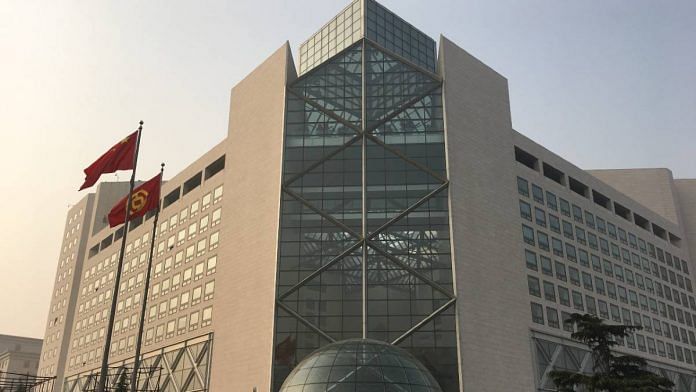New Delhi: Chinese infrastructure investments and overseas projects have been in the news for aggressively expanding Beijing’s interests in needy nations and even pushing some of them into debt traps.
But that’s not all, according to a new book.
As it tries to build influence, China’s on-demand approach to overseas aid projects is particularly vulnerable to domestic political manipulation, so much so that China provides 52 per cent more funding to the home province in which a political leader was born compared to other provinces, according to the book published by Cambridge University Press last month.
Titled Banking on Beijing, the book claims that Chinese development projects in foreign countries are “disproportionately” located in the home areas of political leaders and are usually announced in the run-up to elections in that country. These are typically social infrastructure projects like schools that provide “visible benefits to residents”.
On the other hand, the World Bank vets project proposals based on “economic viability rather than their political value”, the book says.
Examples of this trend in Chinese aid projects can be seen in countries like Sri Lanka, Sierra Leone, Nairobi, Equatorial Guinea, and Tanzania, claims the book.
In Sri Lanka, Mahinda Rajapaksa’s home province, Hambantota, saw an influx of Chinese funding when he was in power. Similarly, Yoni village in Sierra Leone, the hometown of former president Ernest Bai Koroma, saw the building of a renowned school with Chinese aid in 2010, it says.
The book analyses 4,368 Chinese-funded projects (aid and debt) across 138 countries worth roughly $354 billion. These projects were officially committed, in implementation, or completed between 2000 and 2014.
Banking on Beijing has been authored by Axel Dreher, professor of international and development politics at Heidelberg University, Germany; Austin Strange, assistant professor of international relations at the University of Hong Kong; Andreas Fuchs, professor of development economics at the University of Göttingen, Germany, and director of the Kiel Institute China Initiative; Bradley Parks, executive director of AidData, a research lab at the College of William & Mary in the US; and Michael J. Tierney, professor at the department of government and director of the Global Research Institute at William & Mary.
Also read: How ‘organic’ diktat, Chinese infra brought farmers to their knees on Rajapaksa turf Hambantota
‘Home province favouritism’
The book terms the trend of Chinese aid grants favouring the home districts of political leaders “home province favouritism”.
It says, “In the average country, Beijing provides 52 percent more funding to the province in which the political leader was born than to other provinces… By contrast, we find no evidence that World Bank development finance favours the home provinces of political leaders in any region of the world.”
It adds: “This pattern of evidence suggests that China’s on-demand approach is particularly vulnerable to domestic political manipulation.”
A possible counterargument, the authors anticipate, could be that many political leaders are born in capital cities, which may receive more Chinese development finance for reasons unrelated to the fact that a leader was born there.
To counter this, the book argues that they studied the same provinces over time and tested whether a province receives more Chinese funding when one of its “natives” is in power than at other times.
Fast-tracking infra projects
With regard to Sri Lanka — a country currently in the midst of a severe economic and political crisis — the book describes how Mahinda Rajapaksa, while president between 2005 and 2015, tried to transform his home province, Hambantota.
“The Rajapaksa family convinced Beijing’s policy banks to support their rather peculiar vision for the country’s future,” says the book, adding that China Eximbank and China Development Bank issued loans for the construction of a deep seaport, a nearby airport, a road from the seaport to the airport, and an expressway connecting Hambantota to the capital city of Colombo.
It wasn’t just the Rajapaksas, however.
“Beijing also sought to cement its relationship with the Sirisena administration (a reference to former Sri Lankan president Maithripala Sirisena) by taking a page out of the same playbook it had used with Rajapaksa,” the book says, adding that Beijing approved a $100-million grant for the construction of a modern hospital in the then president’s home district of Polonnaruwa. The project was approved in 2018 and completed last year.
The authors also claim that the reason Beijing is able to implement big-ticket infrastructure projects is that Chinese banks approve loan agreements with foreign governments without requiring a competitive bidding process for contractor selection.
In short, foreign governments are encouraged to work with a preselected set of Chinese contractors.
‘Effect particularly strong in Africa’
In a regional analysis of the ‘home province favouritism’ trend, the book found that the effect is most prevalent in Africa.
“The effect is particularly strong in Africa… On average, provinces in African countries receive 70 per cent more funding from China when a leader from that province is in power than the same regions do at other times,” claim the authors.
In contrast, the World Bank does not seem to have this problem, possibly because staff members are aware of efforts by recipient governments to manipulate their projects for domestic political purposes, the book adds.
But not all Chinese-funded projects in the home provinces of political leaders are successful. For example, the book refers to the Mattala Rajapaksa International Airport project near Sri Lanka’s Hambantota port as a “white elephant” — economically inefficient but politically convenient.
(Edited by Poulomi Banerjee)
Also read: Sri Lanka walks a tightrope — Chinese ‘credit card’ on one side, Indian friendship on other



